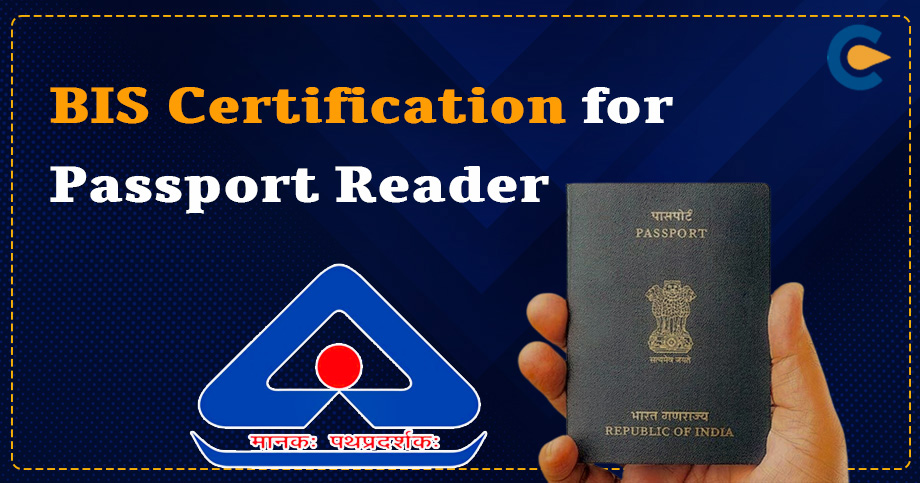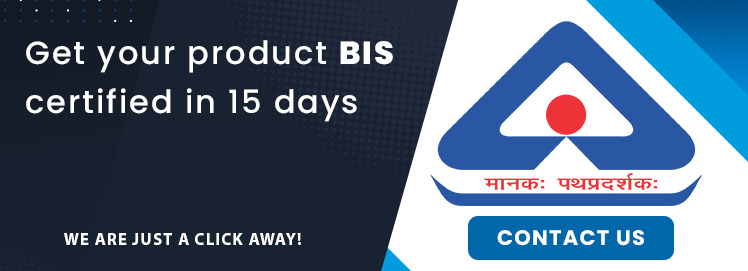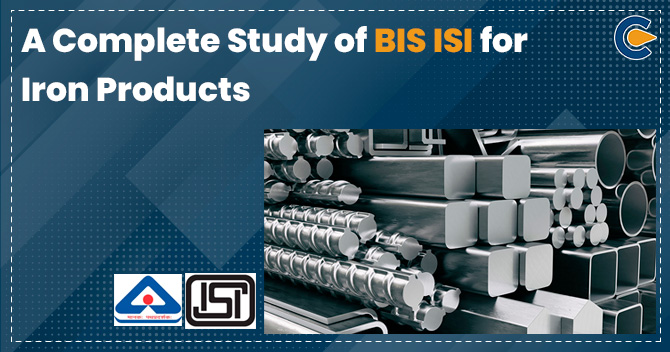Passport Reader is a part of the mandatory BIS Compulsory Registration Scheme as per Indian standard – IS 13252 (Part-1). It cannot be imported, exported or sold in the Indian market without obtaining BIS Certification for Passport Reader. The Compulsory Registration scheme falls under the Scheme II of BIS (Conformity Assessment) Regulations, 2018. In this write-up, we will discuss BIS Certification for Passport Reader.
Passport Reader Machine Technology – An Overview
A passport reader is a passport scanner used in airports and passport renewal offices. Its primary function is to read and authenticate the passport; perform its work in the blink of an eye much faster. The pictures scanned under varied lighting conditions are subjected to extensive software analysis to detect inconsistencies compared to reference photographs of authentic identification papers. The method compares visual and digital data, such as reaching a printed photo, to a digital image stored on an RFID chip. It is compulsory for Passport readers to register with BIS under a Mandatory Registration Scheme. Manufacturers of such products cannot manufacture, sell, distribute, import, export or store without the BIS Registration.
The Optical Character Recognition (OCR)[1] software analysis the scanned images during the passport reading process. First, it identifies the document type and then digitalises the characters. It outputs segmented personal and document data, such as name, date of birth, nationality, document number, expiry date, and more.
This process happens within seconds in the fast-scanning setting of conventional USB models, where the processing is done on the connected PC. The images scanned under different illuminations go through deep software analysis to find discrepancies compared to reference images of genuine identity documents. The system cross-checks visual and digital data, for example, comparing the printed and digital photos stored in the RFID chip.
Overview of BIS Certification scheme
The Compulsory Registration Scheme (CRS) was jointly launched by Ministry of Electronics and IT and the Bureau of Indian Standards in 2012. Ministry of Electronics & Information Technology (MeitY) has officially notified “Electronics & Information Technology Goods (Requirement for Compulsory Registration) Order, 2012” on 3rd October 2012 for 15 categories of electronics items. MeitY added another 15 product categories under this order on 13th November 2014. MeitY added another 13 product categories under this order on 23rd August 2017.
The Ministry of Communications & Information Technology under the Department of Electronics and Information Technology issued a notification on 7th November 2014, which stated the list of products to be included in the Electronics & Information technology Goods (Requirement for compulsory registration) order, 2012. BIS Certification for Passport Reader is included in the mandatory registration with Indian Standards 13252 (part-1) 2010.
Products under Compulsory Certification
The BIS certification scheme is voluntary. But the Central Government has made it compulsory for specific products to comply with Indian Standards. The compliance is set up to maintain public interest, protect human, animal and plant health, protect the environment’s safety, prevent unfair trade practices, and ensure national security.
The central government has made it necessary to obtain approval to use standard marks under a BIS license or Certificate of Conformity (CoC).
The products that fall under compulsory certification are required to obtain the following certificates-
Scheme-I – ISI Mark Scheme
Scheme-II- CRS Scheme
Scheme IV- Grant of Certificate of Conformity
Basic Requisite for BIS Certification for Passport Reader
Following are the 4 main pillars on which BIS Certification depends; without any of these, no applicant can apply for BIS Certification. To get BIS Certification, the applicant must fulfil the following requirements:
- Manufacturer: The Indian BIS License is granted to the manufacturer only, not to importers or sellers. An importer may act as AIR or Foreign Manufacturer and can submit the application to BIS, but the final BIS License is only granted to the manufacturer.
- Product: Each product requires its own License. However, if the same product category covers multiple models, then one License will cover all the models of the same product category. In other words, one product with different models requires a single BIS License or Certification.
- Trademark or Brand: Each Trademark requires its own BIS License.
- Manufacturing Address: Proper manufacturing address shall be mentioned in the documents. If a manufacturer has more than one factory location for a single product, then separate BIS Certification is required for each location.
Guidelines for the Appointment of Authorised Indian Agent (AIR)
According to the standards set by the Bureau of Indian Standards (BIS), The BIS Certification for Passport Reader is certified under Indian Standards IS 13252 (part 1) 2010. The certification procedure depends upon the manufacturing unit’s geographic location. The process of obtaining BIS Certification for Passport Reader for an Indian manufacturer differs from that of a foreign manufacturer, as the foreign manufacturer is not allowed to perform duties and responsibilities in India as per Indian standards. For this, a foreign manufacturer must appoint an Authorised Indian representative who acts as an Indian agent/ representative. An AIR is responsible for applying and performing all the duties on behalf of the foreign manufacturer. BIS has notified specific guidelines to be followed by a foreign manufacturer to appoint an Authorised Indian representative (AIR), which are as follows-
- If the foreign manufacturer has a branch office or liaison office in India, they will become the AIR.
- If the foreign manufacturer does not have a branch office or liaison office in India, but the proprietor or the registered user of the brand or trademark that appears on the trademark is located in India. In that case, the brand or trademark owner will become an AIR.
- Suppose the foreign manufacturer does not have a branch office or liaison office in India, and there is no registered user or proprietor of the brand or trademark that appears on the trademark located in India. In that case, a third party will become an AIR.
- In the case of an Indian manufacturer, they can directly apply to the BIS without appointing an AIR.
Documents necessary for BIS Certification for Passport Reader
Following is the list of essential documents required for BIS Certification for Passport Reader:
- Filled up CDF/CCL form
- Filled up BIS application form
- Business License of the manufacturing unit
- The scope of the Business License
- ISO certificate of manufacturer
- Marking of Label on the product
- Authorisation letter in case where the signatory person is other than the head of the manufacturing
- Certificate of Trade Mark
- Trademark Authorization Letter in case where it is owned by other than the manufacturer
- Registration proof of Authorized Indian Representative Company in India, in case of the foreign manufacturer
- Photo ID proof of Authorised Indian Representative or the Authorized Signatory
- Technical Specification Sheet of Product or user manual
Procedure for obtaining BIS Certification for Passport Reader
To obtain BIS Certification for Passport Reader, the manufacturer must apply for the BIS certificate. The procedure of BIS Registration for domestic (Indian) manufacturers differs from that of a foreign manufacturer.
The procedure followed by a foreign manufacturer is as follows-
- The manufacturer is required to appoint an AIR to perform all the duties on his behalf.
- The application must be submitted with all the necessary documents
- The applicant must submit the product sample for testing to a BIS-approved laboratory.
- The manufacturer must collect the test reports from the BIS-approved laboratory and submit the reports to the BIS office. The reports must be accompanied by a copy of the online application form or hardcopy application form in the case of offline submission.
- The reports are verified and examined at the BIS office.
- After verifying the details, The BIS office grants BIS Certification for Passport Reader to the manufacturer or authorised agent representative (AIR).
The procedure followed by an Indian manufacturer is-
- The application must be submitted along with all the necessary documents
- The applicant must submit the product sample for testing to a BIS-approved laboratory.
- The manufacturer must collect the test reports from the BIS-approved laboratory and submit the reports to the BIS office. The reports must be accompanied by a copy of the online application form or hardcopy application form in the case of offline submission.
- The reports are verified and examined at the BIS office.
- After verifying the details, The BIS office grants BIS Certification for Passport Reader to the manufacturer.
Conclusion
BIS has favoured the national economy through its core activities of conformity assessment and standardisation by providing dependable, safe, and good-quality goods, protecting the environment, minimising health risks to consumers, controlling the proliferation of varieties, promoting exports and import substitutes, etc. Along with benefiting consumers and industry, the standards and certification programme of BIS also support various public policies, particularly in consumer protection, product safety, food safety, environmental protection, building and construction, etc.
Read our Article:How to Obtain BIS Certification for Smart Card Readers in India?













